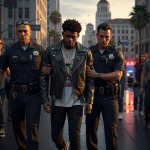“`html
Man Arrested in Viral Video of Woman’s Brutal Beating at Rufus Du Sol Rose Bowl Concert

Suspect Identified and Apprehended Following Widespread Outrage
The electronic music scene is reeling this week following the arrest of a man suspected of brutally assaulting a woman during a Rufus Du Sol concert at the iconic Rose Bowl in Pasadena, California. The incident, captured in a graphic and widely shared viral video, has ignited a firestorm of outrage and renewed calls for safety and accountability at live events. The suspect, identified by authorities as 32-year-old Mark Jenkins of Riverside, was taken into custody late Tuesday night.
The video, which began circulating on social media platforms late Saturday and exploded across the internet by Sunday morning, shows a disturbing scene unfolding amidst the pulsating beats and flashing lights of the popular Australian electronic trio’s performance. In the footage, a man, believed to be Jenkins, is seen aggressively confronting a woman. The interaction quickly escalates, and the man unleashes a torrent of punches and kicks, leaving the woman visibly incapacitated on the ground. Bystanders, seemingly stunned and perhaps unsure of how to intervene, are also visible in the background of the video. The audio captured the screams of shocked onlookers and the jarring sounds of the assault.
Law enforcement officials stated that the arrest followed an extensive investigation spurred by numerous tips from the public, many of whom recognized the suspect from the viral video. Detective Sarah Miller of the Pasadena Police Department commented on the swiftness of the apprehension, stating, “The public’s response was invaluable. Once the video went viral, we were inundated with credible leads. Our team worked tirelessly to identify and locate the individual responsible for this heinous act.” Jenkins was reportedly arrested at his residence without incident. He is currently being held on charges of aggravated assault and battery.
The incident has cast a shadow over what was otherwise a highly anticipated and successful event. Rufus Du Sol, known for their atmospheric soundscapes and electrifying live shows, had sold out the historic Rose Bowl, attracting tens of thousands of fans. The band has yet to issue a formal statement regarding the assault, but many in the music community have expressed their shock and dismay. Online forums and social media pages dedicated to Rufus Du Sol have been flooded with condemnations of the violence and expressions of support for the victim.
The Viral Impact and Public Response
The raw and unflinching nature of the video propelled the incident from a local crime report to a national conversation. Within hours of its initial upload, the footage had been viewed millions of times across various platforms. The immediate and widespread sharing underscored a collective sense of disgust and a desire for swift justice. Social media users, many of whom were present at the concert or are fans of the band, used hashtags like #JusticeForConcertGoer and #RoseBowlAssault to amplify the call for action.
This incident is sadly not an isolated one, but the sheer visibility of this particular assault has brought to the forefront ongoing concerns about safety and behavior at large-scale music events. For years, organizers and venue operators have grappled with issues ranging from overcrowding and inadequate security to instances of harassment and violence. The ubiquity of smartphones and the ease with which videos can be shared have transformed such incidents, turning moments of private brutality into public spectacles and catalysts for change.
The public’s reaction has been largely one of solidarity with the victim. Many who were present at the Rose Bowl have come forward, offering to provide witness testimony and share their own accounts of the evening. There has also been a significant amount of discussion about the role of bystanders and the responsibility of those who witness such acts of aggression. While some have been criticized for not intervening directly, others have pointed to the chaotic nature of a concert environment and the potential danger involved in confronting an assailant.
“It’s incredibly disturbing to see something like this happen in a place where people are supposed to feel safe and enjoy music,” commented concertgoer Emily Carter, who was in attendance at the Rufus Du Sol show. “We were all there to have a good time, and to think that someone would do that to another person in the middle of a concert is just mind-boggling. I’m glad they caught him so quickly.”

Investigative Efforts and Legal Ramifications
The Pasadena Police Department, in collaboration with federal law enforcement agencies, launched an immediate investigation upon being alerted to the incident. The viral video, along with eyewitness accounts gathered from attendees and social media posts, proved crucial in identifying Jenkins. Investigators meticulously analyzed the footage, cross-referencing it with ticket purchase records and security camera footage from the Rose Bowl.
“Our primary objective was to ensure the safety of the public and bring the perpetrator to justice,” stated Captain David Lee of the Pasadena PD. “The evidence collected, including the video and multiple witness statements, provides a strong foundation for the charges being filed. We are committed to pursuing this case vigorously.”
Legal experts suggest that the evidence, particularly the clear video footage, will likely lead to a conviction. The severity of the charges reflects the violent nature of the assault. Aggravated assault and battery charges typically carry significant penalties, including substantial jail time and hefty fines. The victim’s condition and any long-term injuries sustained will also play a role in the sentencing phase.
Beyond the criminal proceedings, there is also the potential for civil litigation. The victim may choose to file a civil lawsuit against Jenkins seeking damages for medical expenses, pain and suffering, and emotional distress. Additionally, questions may arise regarding the security protocols in place at the Rose Bowl and whether more could have been done to prevent the assault or intervene more swiftly. Venue operators and promoters often have a duty of care to ensure a safe environment for attendees.
The arrest of Jenkins marks a significant step towards accountability for the violence that occurred. However, the emotional and physical scars for the victim, and the disturbing nature of the event for all who witnessed it, will likely linger.

The Broader Implications for Live Music Safety
The Rufus Du Sol Rose Bowl incident serves as a stark reminder of the persistent challenges surrounding safety at large-scale music festivals and concerts. While the industry has made strides in implementing security measures, including bag checks, metal detectors, and trained security personnel, incidents like this highlight potential gaps.
One critical aspect often debated is the role of alcohol and substance consumption at concerts. While not explicitly stated that intoxication was a factor in this specific case, it is a common element in many instances of concert-related violence and altercations. Enforcement of responsible alcohol sales and providing adequate resources for those who may have overconsumed are ongoing concerns for event organizers.
Furthermore, the sheer density of crowds at major events can create an environment where individual aggressive behaviors can quickly escalate and be difficult for security to monitor and control effectively. The ability of fans to capture and disseminate events in real-time also means that any lapse in security or instance of misconduct can be instantly amplified, putting pressure on authorities to respond with unprecedented speed.
Industry insiders and safety experts have long advocated for comprehensive security plans that go beyond simply managing crowd flow. This includes proactive threat assessment, effective communication channels between security staff and law enforcement, and robust de-escalation training for personnel. The rapid identification and apprehension of Jenkins in this case can be attributed to these efforts, but the fact that the incident occurred in the first place remains a cause for concern.
As the music industry continues to recover and adapt in the post-pandemic era, the focus on attendee safety must remain paramount. The emotional impact of witnessing such violence, even through a video, can be significant for fans, potentially affecting their willingness to attend future events if they do not feel adequately protected. The swift and decisive action taken by the Pasadena Police Department in this instance is commendable, but it also serves as a catalyst for further dialogue and innovation in concert security protocols. The hope is that lessons learned from this disturbing event will contribute to making future musical gatherings safer for everyone.

Looking Ahead: Accountability and Prevention
The arrest of Mark Jenkins is a critical step towards ensuring justice for the victim and sending a clear message that such violence will not be tolerated. The legal process will now unfold, and the full extent of Jenkins’s accountability will be determined in court. Beyond the legal ramifications, the incident has ignited a vital conversation about the responsibilities of attendees, organizers, and security personnel to foster a safe and respectful environment at live music events.
The rapid spread of the video underscores the power of social media as both a tool for accountability and a platform that can amplify the impact of traumatic events. While the public’s swift response helped lead to Jenkins’s apprehension, it also exposed millions to a disturbing act of violence.
Moving forward, the focus will undoubtedly shift to prevention. This includes strengthening security measures, implementing more effective crowd management techniques, and potentially exploring new technologies that can aid in identifying and intervening in volatile situations before they escalate. Furthermore, educational campaigns promoting respectful behavior and bystander intervention at concerts could play a crucial role in fostering a culture of safety.
The Rufus Du Sol concert at the Rose Bowl was meant to be a celebration of music and community. The actions of one individual cast a dark cloud over that experience. The community’s response, however, demonstrated a collective desire for justice and a commitment to ensuring that such incidents are not repeated. The music industry, along with law enforcement and the public, must work collaboratively to ensure that the joy and shared experience of live music are not marred by violence and that every attendee feels secure. The coming weeks and months will likely see further discussions and potentially concrete changes in how safety is managed at large-scale events across the country, all stemming from the harrowing footage that circulated so widely.

“`















